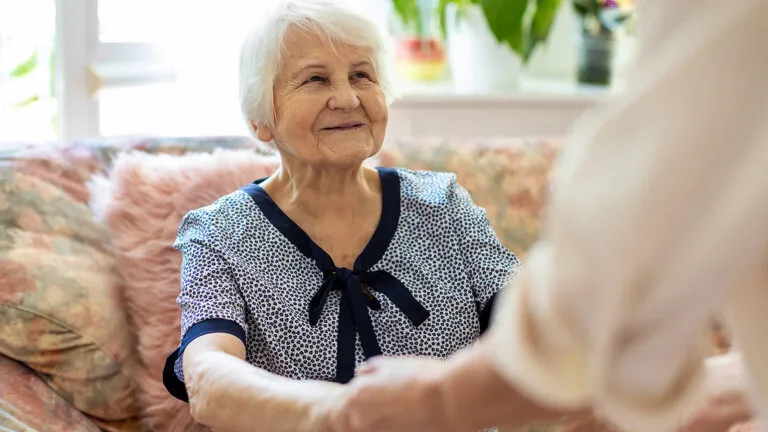One of my mother’s favorite hymns was “I Come to the Garden Alone.” It’s an old hymn about walking with God in a garden “while the dew is still on the roses.” The refrain is the best part: “The joy we share as we tarry there, / none other has ever known.”
By the time Mom died, at age 89, singing that hymn with her was one of the most important parts of our relationship. Mom had Alzheimer’s. She was diagnosed six years before she died, and in her final year she often didn’t remember my name. I watched her change from an articulate, self-sufficient woman of great artistic talent into someone else entirely. Meaningful conversation disappeared. Hymns were one of our last points of connection.
That sounds hard, and it was. But I don’t regret Mom’s last years. I’m a clinical psychologist and a professor of psychology at Fuller Theological Seminary. Over the years, I’ve counseled many people through the loss of loved ones. When it was my turn to be a caregiver, I experienced the truth of what I told my patients—that no textbook or set of treatment guidelines can fully prepare you for the challenges of shepherding another person through their last years. Ultimately, love and God’s grace are what get you through.
That’s especially true with Alzheimer’s. It erodes different aspects of people’s memories at different speeds and in different sequence. My mom was blessed with a cheerful demeanor until she died, but that’s not everyone’s experience. A warm, kind-hearted person can transform, seemingly overnight, into a cantankerous ball of anger and depression. Cherished memories and shared experiences disappear. How do you have a relationship with someone who doesn’t know who you are?
The answer, again, is God’s grace. Immediately after Mom’s diagnosis, I was distraught at the prospect of losing her. Gradually I realized that her fading memory was not pure loss. She was in transition, spiritually packing up her things, emptying room by room, moving a little more each day from life on earth into full life with God.
God was calling her home. My job was to help her with the move. That insight turned what could have been a long, painful goodbye into a richer relationship with my mom, one grounded in our shared relationship with God. Here are a few things I learned that helped Mom and me meet the challenge of Alzheimer’s with grace and good spirit. I hope they help you too.
1. Grow gratitude.
One of my chief memories from childhood is Mom’s unwavering sense of gratitude. No matter what happened, Mom found a reason to thank God.
“I don’t regret it” was one of her signature phrases. She never regretted when bad things happened because she could always find a kernel of goodness in there somewhere—even if the kernel was only that she’d learned a tough lesson or had to rely on God to get through a hard time.
A month before her last birthday, Mom suddenly beamed at me and said, “It just doesn’t get any better than this, does it?” By that point she could barely walk, needed assistance going to the bathroom and no longer remembered her own name. She could have said the same thing any other day of her life. She was no Pollyanna. She acknowledged when things were hard. But she viewed life as a gift from God and assumed his gift was good every day. That helped both of us weather her disease.
Compelling research demonstrates the positive psychological effects of gratitude. Partly inspired by Mom, my wife and I have written in a gratitude journal every night before bed for many years. No matter how hard a day has been, we can always find something to be thankful for. Mom made many appearances in our journal as her disease progressed. Maybe she seemed less frightened driving to a doctor’s appointment. Maybe she said something unexpectedly lucid. Maybe we made it through the day with no new negative developments.
Looking through old entries, I saw proof of God’s ongoing, sustaining presence, even during the hardest times.
Like Mom, I have learned not to regret a single moment.
2. Make a lot out of a little.
My family wasn’t exactly poor as I grew up, but we came close. Dad was a commercial artist, often doing low-paid work for faith-based organizations. Mom took care of my two siblings and me. We had a roof over our heads and food on the table but few extras.
Mom had trained as an artist too—she and Dad had met at art school. Her creativity knew no bounds, especially when it came to making do. When her coat wore out, she used the fabric to create a new, smaller coat for me. When we kids begged for puppets to play with, she made some out of scraps of old cloth and buttons. If there wasn’t much in the fridge, she’d do her best with what she had. She knew how to make a lot out of a little.
That’s a key skill to cultivate while caring for someone with Alzheimer’s. As your loved one’s memory fades, you have less to work with to maintain a relationship. You have to get creative.
For a while, my wife and I could take Mom to church. Soon even that began to confuse her. So we did church activities with her in her room at the assisted living and memory care centers. At the point she could no longer pray, we sang hymns.
When Mom stopped recognizing me and conversation became difficult, I helped her by repeating phrases we’d used when I was a child. I’d sing part of a Broadway refrain: “With you for me and me for you, / …whatever we do. / Together, wherever we go,” she’d join in on the word together. “I love you a bushel and a peck,” I’d say, quoting another song.
“And a hug around the neck,” she’d reply, her face brightening.
Eventually she could no longer go on walks. So I treated car rides to the doctor’s office like walks. I held her hand and pointed out views of the mountains or interesting things on the street.
Individually each of those moments was small, a scrap of time. Like Mom with the puppets, I used those scraps to stitch together an ongoing relationship.
3. Stay involved.
Our youth-obsessed culture, sadly, often casts the elderly aside. The effects can be devastating.
Even if your loved one is living in an assisted care facility, the more time you can spend with them, the better. That’s especially true for their medical appointments. For one thing, you need to be there to ask questions and advocate for your loved one when they’re no longer able to advocate for themselves. Doctors are going to be more responsive to a patient whose family is engaged in their care—it’s human nature.
Even the visits themselves can be opportunities to strengthen your relationship. Some of my best times with Mom came on those doctor visits. We sang in the car and Mom leaned into me trustingly as we walked into the office. Knowing my presence calmed her was a reward in itself.
And Mom’s condition stabilized and even improved a little after she moved from the assisted living center to a memory care facility and I continued to help coordinate her care. Alzheimer’s does not have to become a relentless downward spiral. You can help your loved one by staying involved.
4. Have faith.
Both of my parents modeled deep faith for me. My dad (who died many years ago of heart disease) taught me the value of knowing what I believe and why I believe it. Mom showed me how to live with trust in God’s love and care.
“Keep us close to you,” she prayed each night at my bedside growing up. Mom always felt close to God. She saw him everywhere. Once, as a child, I told her I wished I could turn into a bird so I could get close to other birds without scaring them. “That’s exactly what Jesus did with us,” she replied. “He became one of us and lived with us.” For Mom, the whole world was a living testament to God’s presence.
That faith sustained both of us during her last years. For a long time, even after she’d lost the ability to keep up a conversation, she would snap to attention and join me the moment I started praying. After she lost the ability to pray, hymns became her prayer.
I believe there was more going on in her mind and her soul than she was able to communicate. One day, a little more than a year before she died, Mom smiled at me and said, “This is just a phase in God’s working.” I realized she was in touch with God in a way perhaps too deep for words. She truly was moving from this life to the next.
If you are caring for someone with Alzheimer’s or another progressive disease, have faith. You and your loved one will change as the disease advances, but some changes will be good for both of you. Trust that the change is being shepherded by God. For a while, Mom was distressed that someone was stealing her possessions. It turned out that she’d been hiding things, then forgetting where she’d put them. One day, she forgot to be afraid about theft and stopped hiding things. The problem solved itself. To quote Mom, it was just a phase in God’s working.
The last verse of the hymn says it best: “I’d stay in the garden with him / though the night around me be falling, / but he bids me go; through the voice of woe / his voice to me is calling.”
I am so grateful for my walk in the garden with Mom. God called to her; she followed his voice. For a few precious years, I got to go along, and I look forward to our reunion in heaven.
For more inspiring stories, subscribe to Guideposts magazine.





